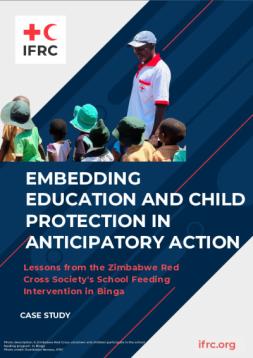Lessons from the Zimbabwe Red Cross Society’s School Feeding Intervention in Binga
Discover how embedding education and child protection within anticipatory action is transforming the lives of children in drought-affected regions of Zimbabwe. This innovative initiative by the Zimbabwe Red Cross Society (ZRCS), in collaboration with key humanitarian partners, integrates early action protocols, school feeding and protection measures to support vulnerable children and their communities.
In Binga District, Matabeleland North Province, where recurrent El Niño-driven droughts have exacerbated food insecurity, disrupted education, and heightened child protection risks, the school feeding intervention offers a critical lifeline. This initiative provides fortified meals to over 5,378 children in 11 primary schools, ensuring continued school attendance and reducing risks of school dropout, child labor and early marriage.
Our approach is rooted in community engagement, prioritizing locally driven solutions that align with the needs identified by children, parents, and educators. The intervention not only improves school retention and cognitive development but also strengthens child safeguarding, with structured feedback mechanisms allowing children to voice concerns in a safe and supportive environment.
By combining anticipatory action with education and child protection, this initiative demonstrates how timely interventions can safeguard children's well-being in crisis-prone settings. Community ownership plays a vital role, with over 175 parents and volunteers actively involved in daily meal preparation, fostering sustainability and resilience.
Join Us in Driving Change
Learn how anticipatory action can be leveraged to protect children and support education in crisis-affected areas. Explore key successes, lessons learned, and best practices that can be adapted to different contexts.
📥 Download the full case study to gain insights into our impact and discover practical strategies for integrating child protection and education in humanitarian response:




